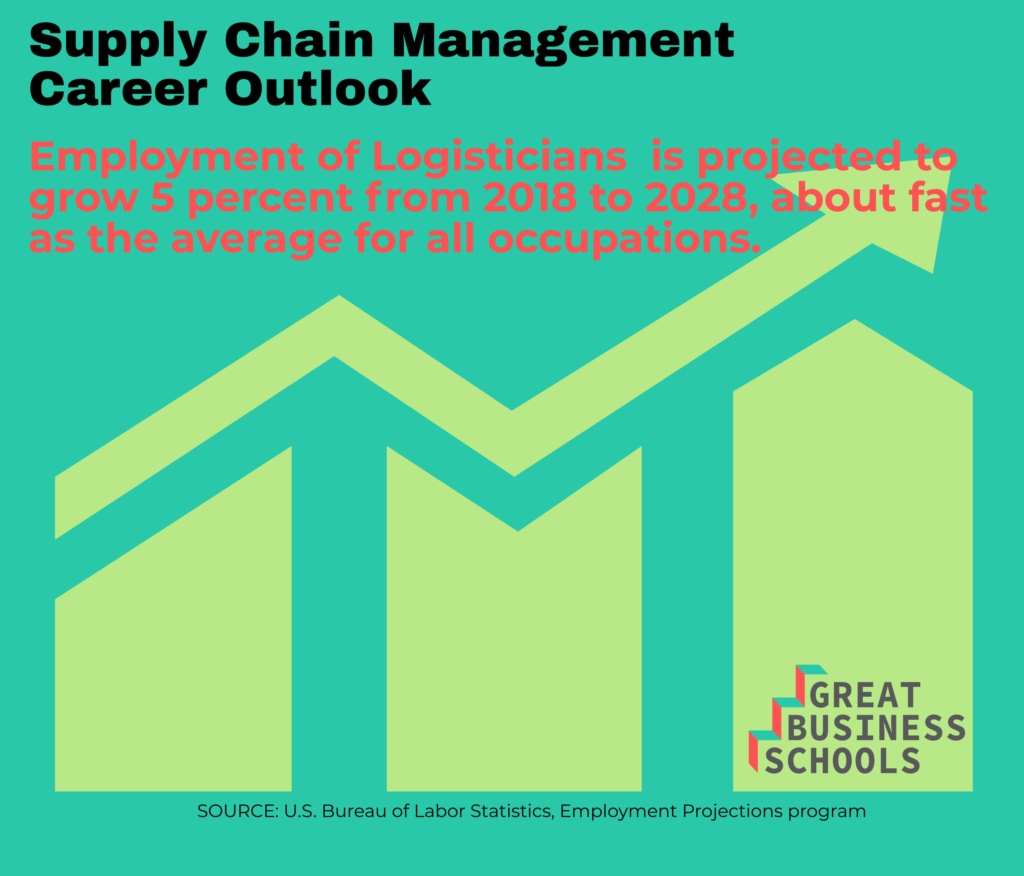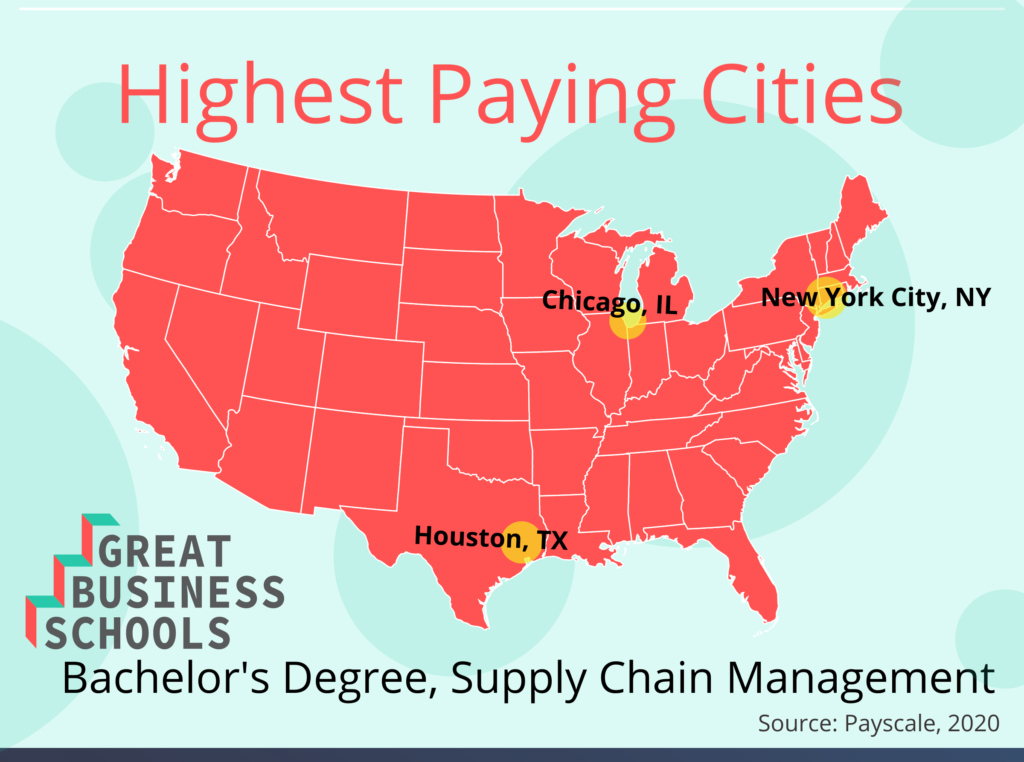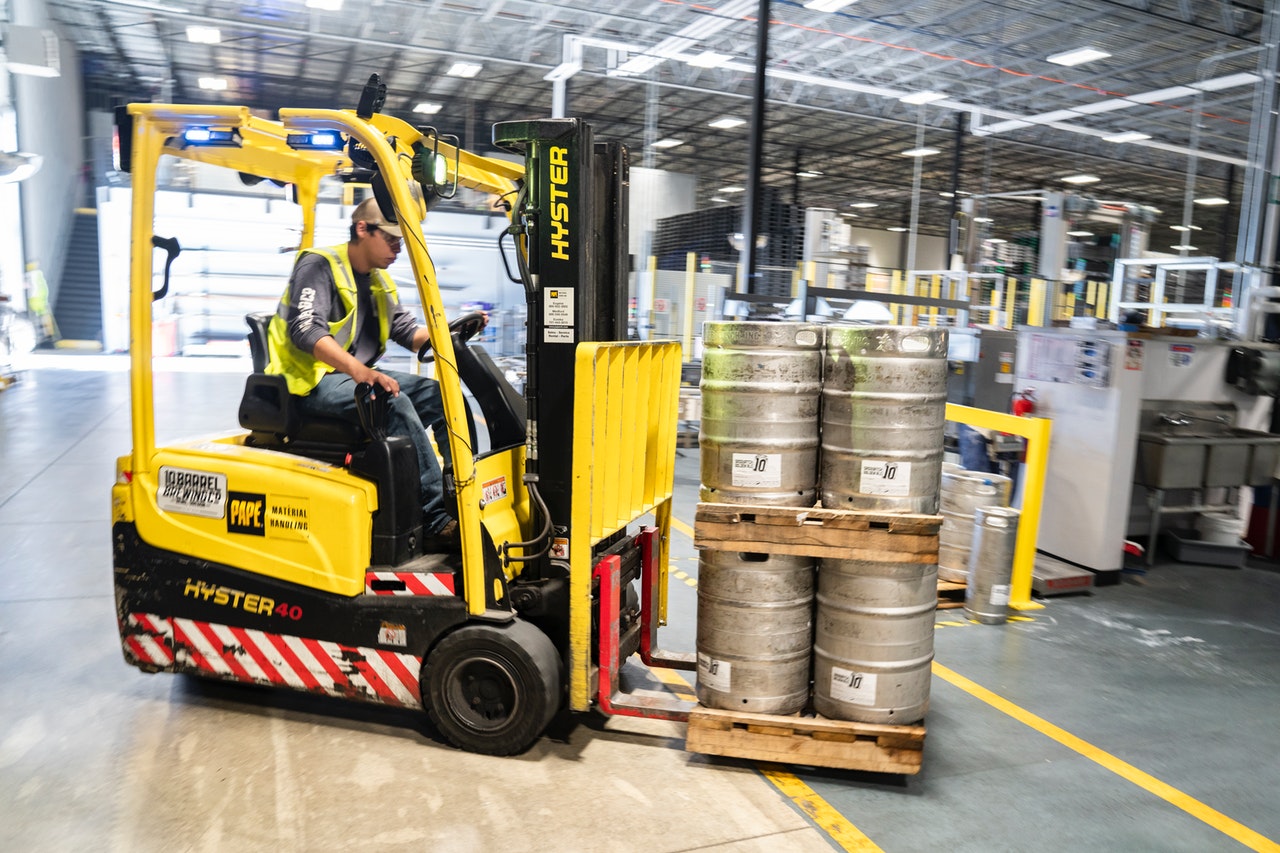The supply chain management industry is growing, and so far, that growth isn’t slowing down. In this expanding economy, supply chain managers play an important part in the business world, which means that workers with a supply chain management degree are in high demand. With a degree or certificate, you can gain a great career with an impressive salary, and it won’t take you long to start earning.
What is supply chain management, and what can you do with a supply chain management degree? The answer to that second question covers more options than you may think. Supply chains are complex, which means that supply chain managers wear a lot of hats, and a degree can propel you into a lot of directions.

For now, though, start with the first question. What is supply chain management? To understand that question, you have to understand what a supply chain is. Every commodity in the world started as a group of supplies. Each product goes through a process to go from simple supplies to a finished product. Every step in this process is part of something called a supply chain. Each step matters, from the moment supplies are ordered to the moment that the finished product gets put into the end user’s hands.
Featured Programs
That’s a supply chain, so what is supply chain management? It’s the process of overseeing the supply chain process. Supply chain managers make sure that every step in the supply chain runs smoothly. They often implement new policies to make supply chains more effective and efficient. They also lead the teams of people who have jobs within the supply chain. Businesses, nonprofits, and government organizations count on supply chain managers to make sure that products get exactly where they need to go.
Supply chain managers may simply oversee supply chains in the US, but some have careers that reach a bit further than that. These far-reaching overseers are involved in global supply chain management. So, what is global supply chain management? In today’s global economy, supplies and products come from all over the world. Basically, the question of “what is global supply chain management?” provides the same answers as domestic supply chains, but it does so on a much larger scale. Global supply chain managers keep track of supply chains as they extend across the globe. They have to maintain communication with oversees contacts, understand how things like weather impact global shipping, and keep the supply chain as cohesive as possible.
Why does the world need supply chain managers? What is the value of supply chain management? Supply chain management brings a lot to the table. Managers make supply chains simpler and more efficient. As a result, they cut costs and save businesses a lot of money. They also make sure that products get to their clients quickly, which boosts client satisfaction and can increase brand loyalty. Because they help businesses thrive, supply chain managers can play a big role in boosting the economy.
If you want to be a part of this career, you can start with a supply chain management degree. Read on to get a better understanding of your options.
School and Program Accreditation
A supply chain management degree is one of the most straightforward ways to get your career started, so it’s important to find the best program for your needs. When you’re looking for supply chain management programs, it’s important to look specifically for accredited supply chain management courses. If you’re planning to earn a degree or certificate, then make sure that the college you attend has accreditation. When a school or program is accredited, it means that a trusted, qualified, and unbiased source has determined that the program meets certain educational standards. When a school isn’t accredited, you can’t be sure that you’re getting all of the relevant training that you need, and your potential employers can’t be sure, either.
There are several national and regional organizations that accredit schools. To find out if a college is accredited, take a look at its website. A lot of colleges prominently display their accreditation status that way. If you can’t find a college’s accreditation status that way, you can search online for “[school name] accreditation.”
Types of Supply Chain Management Degrees
You have several options for obtaining your supply chain management education. First, there’s the supply chain management degree. What is a supply chain management degree? Degrees in supply chain management are full bachelor’s degrees that cover the supply chain management training that you’ll need on the job. Bachelor’s degrees usually include several core classes on the basics, and then they move on to more specialized knowledge and hands-on training. Supply chain management degrees teach what a supply chain is, how supply chains are run, and how managers make positive changes for those chains.

Degrees in supply chain management come in several varieties, and as long as you choose an accredited program, you can choose whichever option works best for you. First, there are traditional supply chain management degrees. Those who choose this type of supply chain management degree get the traditional college experience. They attend classes on campus, usually during the daytime. Many of these students live in dorms on campus or in nearby apartments. They experience the campus itself and the city in which the campus exists. Usually, these degrees take four years to earn. Is the traditional supply chain management degree right for you? It may be your best choice if:
- you want the “traditional” college experience with classrooms, events, and sports.
- you learn best in person and/or need some accountability to do your school tasks.
- you prefer learning with a group of people.
Next, there are supply chain management degrees online. A supply chain management online degree will give you the same level of education that an on-campus degree would provide. There’s no difference in subject material or educational quality. The only difference is that you learn from your own computer, sometimes at your own pace. Online supply chain management degrees are generally geared toward working adults. The online format provides flexibility that on-campus degrees can’t provide.
Online degrees in supply chain management do require a certain level of self-discipline. Successful online students need to keep themselves motivated enough to log into their classrooms and get their work done, especially when their courses have no set login times. If you wouldn’t describe yourself as as “self-starter,” then you might consider choosing a different option or soliciting accountability help from a partner or friend.
If you pursue a supply chain management online degree, you might also find accelerated options. Accelerated online supply chain management degrees are challenging because they require the same amount of work, but students must complete that work in a shorter timeframe. However, they do make a good choice for those who want to kickstart their careers quickly and save some money on tuition. Should you look for supply chain management degrees online? They may be the best choice for you if:
- you’re an adult or otherwise not a traditional college student.
- you have a job, children, or other responsibilities that keep you from a regular class schedule.
- you want an accelerated degree.
- you’re self-motivated and can start your work on your own.
A lot of people ask “What can I do with a supply chain management degree?” Whether you learn online or in person, you can take one of several career paths, including but not limited to:
- supply chain manager
- purchasing manager
- logistics manager
- production manager
- storage and distribution manager
These fields are in high demand, so job prospects look good for supply chain managers. With so many potential pathways, it turns out that “What is a degree in supply chain management?” has more answers than most people realize.
Later, you may consider an MBA in supply chain management, or another type of master’s in management.
Featured Programs
Certifications or Licenses for Supply Chain Management
Now, you don’t necessarily need a full bachelor’s degree to pursue a career in supply chain management. There are also certifications in supply chain management. Supply chain manager certification options are sometimes listed under different names. For example, some programs are simply called “supply chain manager certification,” while others may have names like “supply chain management and logistics certification.” Because of these different options, you should take your time exploring your certificate options before you choose one. You can find certificate options through some accredited colleges or the Association for Supply Chain Management.
Just like with full degrees, certifications in supply chain management can be earned either in person or online. Each option comes with its own pros and cons. An in-person certification comes with more structure and accountability, while online supply chain management certification comes with more flexibility. There’s another advantage to looking for certification in supply chain management online, and it’s the fact that online supply chain management certification options are often easier to find than in-person supply chain manager certification options. If you want in-person classes, you may have to spend more time searching for programs.
In any case, supply chain management and logistics certification can make a great choice for those who don’t want a full degree just yet. Certifications in supply chain management come with some advantages over bachelor’s degrees. For one thing, certificates take less time to earn. While a bachelor’s degree can take four years, you can earn a certification in logistics and supply chain management in as little as a few months. At most, earning a certification in supply chain management — online or in person — will take one to two years. Certificates cost far less money than degrees, too, which makes them an appealing option for a lot of students.
However, keep in mind that with a supply chain management certification, salary potential tends to be lower than it is for people who have a bachelor’s degree. Some jobs do require a full degree, which means more limited job opportunities for those who have certificates. However, just because you earn a certificate now doesn’t mean that you can’t earn a full degree later. A lot of people pursue a certificate first so that they can get their careers started faster. Then, after saving up some money or finding an employer with a college reimbursement program, they pursue a bachelor’s degree and increase their earning potential. If you choose this route, some colleges may credit transfer classes from your supply chain management certification. Online programs and in-person programs both come with training that you’d also find in a four-year program.
Careers in Logistics and Supply Chain Management
The supply chain management jobs outlook is very promising. As a matter of fact, you can pursue a lot of jobs with a supply chain management degree. You’ll find a basic list if you take a look under the “Types of Supply Chain Management Degrees” section, but in this section, you can dive a little deeper into the roles of a supply chain manager.

First, there’s the general supply chain manager role. So, what is a supply chain manager, and what does a supply chain manager do? The supply chain manager definition is fairly simple. As explored above, a supply chain manager is someone who oversees a supply chain or part of a supply chain. However, while the supply chain manager definition may be simple, supply chain manager tasks are far from it. For a supply chain manager, responsibility is key because the list of supply chain manager job responsibilities is a long one.
The supply chain manager job description includes developing a supply chain, sometimes from the ground up. Supply chain managers identify setbacks in company supply chains, and they develop solutions for those problems. They make their supply chains as efficient as possible so that products can reach consumers in a timely way. Often, the supply chain manager job description includes communicating with consumers to maintain high customer satisfaction levels. Supply chain managers also lead teams as they implement new strategies.
Of course, the supply chain manager description can get more specific depending on the specialization. The supply chain manager job description and salary, therefore, can include a range of answers. This is where the “What is a supply chain manager?” question can get a bit complicated. However, it also means that there are plenty of job prospects for people in this field. For example, there are logistics and supply chain manager jobs. Those who have jobs in supply chain management and logistics focus specifically on the logistics (i.e. transportation) portion of the supply chain. When people ask “What is a supply chain manager?” logistics managers often get brought up because they play such an important role.
Supply chain and logistics management jobs include overseeing teams of logistics operators. They make sure that everything runs smoothly in the supply warehouses. Sometimes, a logistic and supply chain management job involves overseeing a specific region. For example, if a large business has multiple locations, a logistics manager might be in charge of shipping and handling for just one of those locations. Logistic and supply chain management jobs, like other supply chain management responsibilities, require consistent multitasking and strong leadership skills.
Next, there are jobs in operations and supply chain management. Operation and supply chain management jobs have responsibilities that go beyond the supply chain. In addition to the usual supply chain manager description, operation and supply chain management jobs involve general company oversight. They often make hiring decisions, look for ways to decrease overhead costs, and lead teams. The operations and supply chain management job description can be intimidating, but those who have strong organizational and leadership skills can really thrive in these positions.
When it comes to jobs in operations and supply chain management, and when it comes to jobs in supply chain management and logistics, keep in mind that you likely won’t jump into one of these jobs right away. Furthermore, keep in mind that these are jobs with supply chain management degree experience, so you’ll have to earn a bachelor’s degree before you reach those levels.
When you enter the job market, you’ll want to look for entry-level jobs in supply chain management. Entry-level jobs in supply chain management usually come with fewer responsibilities than, say, logistics and supply chain management jobs. With entry-level supply chain management jobs, a new employee may assist a more experienced supply chain manager. Supply chain management entry-level jobs can be obtained either with a bachelor’s degree or a certificate.
Supply Chain Management and Logistics Salary
Because supply chain managers are in high demand, one can live quite comfortably on a supply chain management salary. Just like with any other career, the supply chain management starting salary is smaller than the supply chain management average salary. The average starting salary for supply chain management is nearly $59,800. That number goes up with experience. By mid-career or so, a supply chain manager salary is over $83,600 on average.
Keep in mind, though, that the supply chain management average salary is just that: an average. Use the supply chain manager average salary and the supply chain management entry-level salary as rough estimates of what you can expect, but make sure that you consider other factors, too. Aside from experience level, there are other things that can impact a supply chain manager’s salary. For example, education level can impact a supply chain manager’s salary. Those who have a bachelor’s degree or higher will generally make higher supply chain management salaries than those who have earned a certificate.
Supply chain management salaries also vary depending on the city and state. A supply chain management salary in a large, busy city will virtually always be more than a supply chain manager salary in a rural area. Furthermore, the size of the company can also have an impact on supply chain manager salaries. Bigger companies mean more responsibilities, and more responsibilities usually mean better pay.
Finally, salary can vary depending on job specializations. For example, consider a logistics and supply chain management salary. A logistic and supply chain management salary starts at nearly $62,000, which is higher than the general starting salary. Again, however, to earn a supply chain management and logistics salary, you’ll likely need a bachelor’s degree. A supply chain and operations management salary will also be on the higher side. The operations and supply chain management salary is nearly $98,000 on average. A degree is also required for this career.

Professional Organizations in Supply Chain Management
There are several supply chain management professional organizations in America. These organizations include
- The Association for Supply Chain Management (ASCM)
- The American Production and Inventory Control Society (APICS, which has merged with ASCM)
- The Council of Supply Chain Management Professionals (CSCMP)
Other organizations exist for more specific supply chain job descriptions, but the three listed above are some of the more recognizable organizations in the supply chain field. Joining a professional organization can help you enhance your career. For one thing, these organizations provide networking opportunities. They provide centralized hubs for supply chain managers to gather and meet one another. Networking is an important part of almost any industry, so any organization that makes networking easier is indispensable. These opportunities are valuable, especially when you’re trying to get a job.
Speaking of getting a job, these professional supply chain organizations also provide a springboard into the job market. They often have job boards that people can use to seek employment. Finally, professional supply chain organizations may help you continue your education. For example, the ASCM has on-demand online courses that professionals can use to hone their skills and stay up to date. According to its website, ASCM often updates these courses to reflect the latest changes in the industry. Some professional organizations may also offer continuing education credits. These credits help professionals with a certificate or associate’s degree to move forward to a bachelor’s degree. Credits are used to reimburse learners for the courses that they take. This way, money doesn’t have to be a barrier to education.
With all of these benefits available, professional organizations can make a huge difference for supply chain management professionals, especially for those who are in the early stages of their careers. Take a look at their websites to see how you can join.
Carrie Morris
Author
Warren Dahl
Editor-in-Chief

